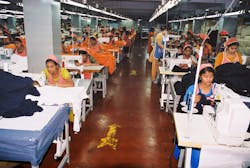Why are Workers Still Dying in Factory Fires in Bangladesh?
In 2013, which to me is a very long time ago, Sandy Smith, then Editor-in-Chief of EHS Today, wrote: “How long until factories in Bangladesh manufacturing goods for U.S.- and European-headquartered companies are safe for workers?
So why eight years later are we writing about 52 workers who died in a factory fire in Bangladesh on July 8?
How can it be in this day and age factory owners are still locking doors preventing workers from escaping fire?
At the Hashem Food and Beverage factory in Rupganj, an industrial town 15 miles east of Dhaka, 52 workers, including children as young as 11, died in a massive fire that began on July 8 and raged on for more than a day, according to a report from Al Jazeera.
The news outlet reported that Jayedul Alam, police chief for Narayanganj district where the factory is located, said the entrance had been padlocked at the time of the blaze and the factory breached multiple fire and safety regulations. A fire services spokesman also said the exit door to the main staircase had been padlocked. Highly flammable chemicals and plastics had also been stored in the building.
If this sounds all too familiar, Bangladesh, which employs tens of thousands of low-paid workers making garments for large international companies has a long and tragic history of industrial disasters.
“Continuing corruption and lax enforcement have resulted in many deaths, over the years, AP said in an article.
After the horrific collapse of the Rana Plaza garment factory that killed more than 1,100 people, the country imposed tougher safety rules. An agreement between Bangladeshi unions and international brands was signed -- The Accord on Fire and Building Safety in Bangladesh. It was a five-year agreement signed in May 2013 and extended until 2018 and it will expire again on August 31, 2021.
According to Remake, the initial inspection of Bangladesh’s factories in 2013 found “more than 87,000 safety issues, including more than 50 factories that were at immediate risk of collapsing”. Since then, more than 90% of the original hazards which were identified have been eliminated, a result of 38,000 initial and follow-up inspections
While an important step, there are still issues. According to the AP, “the country’s garment industry has since become largely compliant under domestic and global watchdogs. But many other local industries fail to maintain safety compliance and the disasters have continued. In 2019, 67 people were killed when a complex housing warehouses, shops and apartments caught fire.
Responding to this latest tragedy the International Labor Association gave this statement:
This incident illustrates the urgent need in Bangladesh for authorities and building owners to ensure that buildings in which thousands of workers spend the better part of their day are built and operated in compliance with national code requirements. If the fire safety measures required by the regulations were properly implemented, it would provide for the safe evacuation of occupants in this type of emergency.
This cannot and should not ever happen again. Tighter regulations must ensure worker's safety and we should never have to write another story like this.
About the Author
Adrienne Selko
Senior Editor
Email [email protected]
Adrienne Selko is also the senior editor at Material Handling and Logistics and is a former editor of IndustryWeek.

